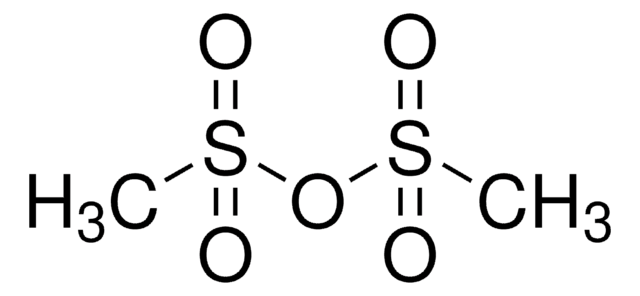380814
Eaton′s Reagent
Synonym(s):
Phosphorus pentoxide, 7.7 wt. % in methanesulfonic acid
About This Item
Recommended Products
form
liquid
Quality Level
concentration
7.2-8.5% P2O5 (by NaOH, titration)
refractive index
n20/D 1.435
bp
122 °C/1 mmHg
density
1.5 g/mL at 25 °C
SMILES string
CS(O)(=O)=O.O=P(=O)OP(=O)=O
InChI
1S/CH4O3S.O5P2/c1-5(2,3)4;1-6(2)5-7(3)4/h1H3,(H,2,3,4);
InChI key
JHNLZOVBAQWGQU-UHFFFAOYSA-N
Looking for similar products? Visit Product Comparison Guide
General description
Application
- Fluorene-based hole-transporting material.
- Mono and bis-chalcone derivatives via Claisen-Schmidt condensation reaction between arylaldehydes and ketones.
- 4-Hydroxycoumarins and 4-hydroxy-2-quinolinones derivatives.
Signal Word
Danger
Hazard Statements
Precautionary Statements
Hazard Classifications
Acute Tox. 4 Oral - Eye Dam. 1 - Met. Corr. 1 - Skin Corr. 1A - STOT SE 3
Target Organs
Respiratory system
Storage Class Code
8A - Combustible corrosive hazardous materials
WGK
WGK 1
Flash Point(F)
235.4 °F - closed cup
Flash Point(C)
113 °C - closed cup
Personal Protective Equipment
Choose from one of the most recent versions:
Certificates of Analysis (COA)
Don't see the Right Version?
If you require a particular version, you can look up a specific certificate by the Lot or Batch number.
Already Own This Product?
Find documentation for the products that you have recently purchased in the Document Library.
Customers Also Viewed
OLEDs.
Our team of scientists has experience in all areas of research including Life Science, Material Science, Chemical Synthesis, Chromatography, Analytical and many others.
Contact Technical Service














